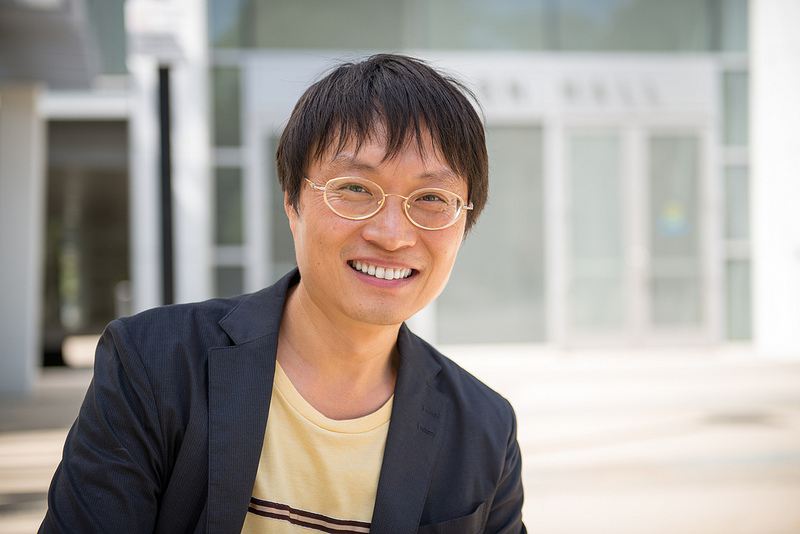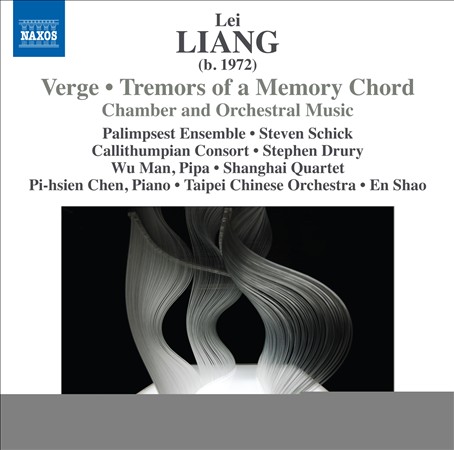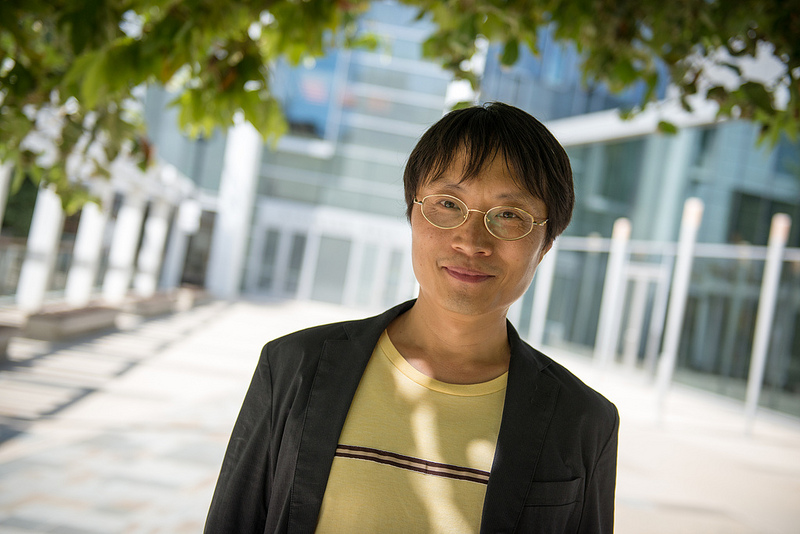Technology Institute Appoints Lei Liang Composer in Residence
UC San Diego Composer Merges Technology and Tradition
San Diego, Sept. 24, 2013 -- He has lived in the United States for more than 20 years, but composer Lei Liang has never lost touch with his Chinese musical roots, and they are audible even in the avant-garde compositions that earned him praise as “one of the most exciting voices in New Music” (according to the British publication The Wire).
|
Now an associate professor of music at the University of California, San Diego, Liang will explore those roots as Composer in Residence at the Qualcomm Institute, the UC San Diego division of the California Institute for Telecommunications and Information Technology (Calit2).
“I look forward to collaborating with many colleagues at this institute because I can envision exciting works arising from the intersection with different disciplines and the cutting-edge technologies that the scientists and engineers are developing,” said Liang. “My work is generally categorized as being ‘new music,’ but I draw heavily from the past. I hope to find completely new ways – both technically and artistically – of bringing past sensibilities to modern audiences.”
“We are pleased to welcome Lei Liang as our new Composer in Residence,” said Qualcomm Institute Director Ramesh Rao. “We believe that his presence and work will continue to bring a fresh intellectual and cultural dimension to the institute that will inspire our entire organization.”
Liang’s three-year appointment runs through June 30, 2016. Funding from the Qualcomm Institute will help the composer hire graduate student researchers, fund access to spaces and facilities for R&D and performances of his compositions, and allow Liang to spend additional time composing. The institute will provide office and studio space in its Atkinson Hall headquarters, as well as audio hardware and software upgrades to existing lab equipment used by Liang’s predecessors.
Liang is the Qualcomm Institute’s third Composer in Residence. He follows Pulitzer Prize-winner Roger Reynolds (2007-’10) and current UCSD Department of Music Chair Rand Steiger (2010-’13). The Department of Music, together with the Division of Arts and Humanities, provides supplementary funding for the Qualcomm Institute’s Composer in Residence program.
|
Born in Tianjin, China, the 40-year-old Chinese-born American composer was back in Tianjin recently, for the first in a series of composition forums in China and Japan staged at conservatories and universities at Tianjin, Guangzhou, Xiamen, Nagoya and Kanazawa. Liang grew up in a family of musicologists, and in 1990 he moved to the U.S., where he studied at the New England Conservatory of Music. In 1998, Liang was selected to the Harvard Society of Fellows, and in 2006 Liang earned his Ph.D. at Harvard University. That same year, Harvard also gave Liang its George Arthur Knight Prize for his string quartet, Serashi Fragments. Later Liang taught composition at Middlebury College for one year prior to joining the UC San Diego faculty in 2007.
Among his honors, Liang received a Guggenheim Fellowship for 2009-’10, and an Aaron Copland Award in 2008-’09. He spent much of 2011 in residence at the American Academy in Rome after winning the 2011 Rome Prize in composition, and Liang received the Herb Alpert Foundation’s Alpert/Ragdale Music Composition prize in 2012.
Liang’s most recent CDs include VERGE (2012, published by Naxos), with the title track performed by the Palimpsest Ensemble under UCSD music professor Steven Schick as conductor. Written for string orchestra, VERGE was featured in August at the Yellow Barn Music Festival in Vermont. Two other CDs, MILOU (2011, New World Records) and BRUSH-STROKE (2009, Mode Records), feature performances of Liang’s varied compositions for solo instrument, chamber ensemble, orchestra and electronics.
As a composer, Liang has written works for Western as well as Asian instruments, including Japan’s shakuhachi bamboo flute and the Chinese lute called pipa. He fulfilled commissions from the New York Philharmonic, Fromm Music Foundation, the Harvard University Asia Center, the Heidelberg Philharmonic, the Manhattan Sinfonietta, and the Ying Quartet, among other ensembles and organizations. He has also worked closely with visual artists, architects, and choreographers, including the Tony Award-winning Garth Fagan, whose choreography to Lei Liang’s music was named by the New York Times as #3 of the “top six dance watching moments” of 2009.
Liang showed promise early on, winning prizes as both a pianist and composer while still a teenager. In 1988 he won second prize for performance on the piano at the Jing-Jin-Sui competition, and that same year, his composition for piano earned Liang second prize in the Xinghai competition. In 1989 – the year before he moved to the United States – Liang was named one of ten Persons of the Year by Beijing Youth Daily.
Liang has maintained an active interest in cultural preservation.
|
“Digital technologies are critical for preserving artifacts of the past,” said Liang. “Hopefully we can create databases and multimedia software tools to explore and safeguard recordings in order to make them available to wider audiences, in settings that will create new experiences. At the same time, I hope some of my work will help showcase the exciting technologies being developed here.”
Having inherited his interest in musicology from his parents, Liang has focused primarily on preserving traditional music from China and other Asian countries, and his research has appeared in Asian as well as U.S. publications. He co-produced historical recordings from the Nei Mongol (Inner Mongolia) autonomous region of China and digitized historical recordings for the Music Research Institute of the Chinese Academy of Arts in Beijing. Liang also recorded an extensive interview for the Archive of World Music with Ni Qiu-ping, a master of the jinghu, a two-string fiddle used in Peking Opera.
The next major performance of Liang’s work on the UC San Diego campus will come in January 2014, when the Radnofsky Saxophone Quartet is scheduled to play his work Yuan, in the Conrad Prebys Concert Hall. It will be followed in February by the world premiere of a new work by Liang for percussion solo, to be performed by fellow UC San Diego music professor and percussionist Steven Schick at the Miller Theater in New York City.
Lei Liang's music is recorded on Mode, New World, Naxos, Innova, Telarc, GM, Encounter, Spektral, Opal and Bridge Records (forthcoming). His music is published exclusively by Schott Music Corporation, New York.
Related Links
Media Contacts
Doug Ramsey, 858-822-5825, dramsey@ucsd.edu



